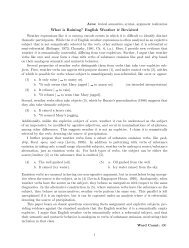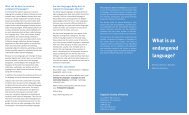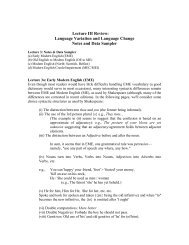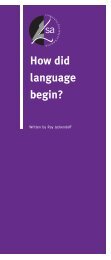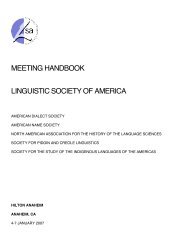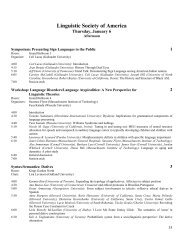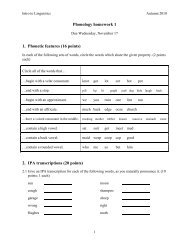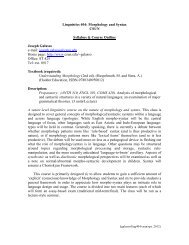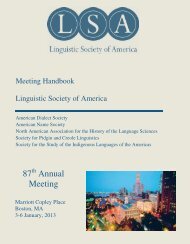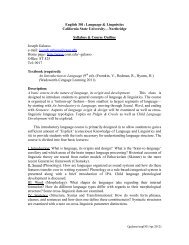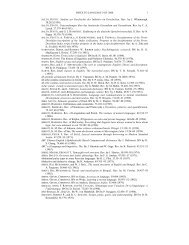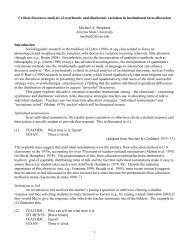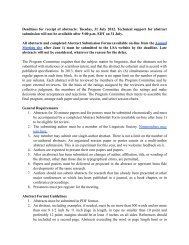here - Linguistic Society of America
here - Linguistic Society of America
here - Linguistic Society of America
Create successful ePaper yourself
Turn your PDF publications into a flip-book with our unique Google optimized e-Paper software.
WorkshopFriday, 4 JanuaryIncorporating <strong>Linguistic</strong> Theory Into a Language CurriculumFairfield/Exeter/Dartmouth9:00 – 10:30 AMOrganizers:ParticipantsVera Lee-Schoenfeld (University <strong>of</strong> Georgia)Chad Howe (University <strong>of</strong> Georgia)Patrícia Amaral (University <strong>of</strong> North Carolina at Chapel Hill)Chad Howe (University <strong>of</strong> Georgia)Stefan Huber (University <strong>of</strong> South Florida)Vera Lee-Schoenfeld (University <strong>of</strong> Georgia)Christopher Sapp (University <strong>of</strong> Mississippi)Thomas W. Stewart, Jr. (University <strong>of</strong> Louisville)This special session grows out <strong>of</strong> the situation surrounding the discipline <strong>of</strong> linguistics at the University <strong>of</strong> Georgia. Given itsprogram status, linguistics has faculty members across a variety <strong>of</strong> different academic units, including language departments. TheDepartments <strong>of</strong> Romance Languages and Germanic & Slavic Studies at UGA both <strong>of</strong>fer courses designed to introduce students toissues <strong>of</strong> linguistic interest in a particular language (mainly French/Spanish and German). These courses are also listed as part <strong>of</strong>the general repertoire <strong>of</strong> courses for graduate and undergraduate students in the Program in <strong>Linguistic</strong>s. In<strong>here</strong>nt in these crosslistedLING/SPAN/ROML and LING/GRMN courses is providing an accessible introduction to issues pertaining to linguistictheory to students who have very little (if any) background in the linguistic sciences and who have not been exposed to thetechnical terminology that is introduced in linguistics courses. Likewise, it is <strong>of</strong>ten a challenge for linguistics students to producein-depth research <strong>of</strong> a language they do not speak and may not have studied. The goal <strong>of</strong> the session is to discuss different ways <strong>of</strong>tackling these challenges by bringing together pr<strong>of</strong>essors from various institutions who find themselves in situations similar toours (i.e. colleagues who teach linguistics as part <strong>of</strong> language programs). Because this meeting <strong>of</strong> the LSA is being held inconjunction with the Modern Language Association Convention, we believe this to be a timely opportunity to discuss thecomplementary benefits <strong>of</strong> integrating linguistics and foreign language education.The intent is to provide an opportunity to develop plans for creating course materials that closely integrate general language skillswith specific knowledge <strong>of</strong> linguistic concepts. This will involve the collaborative efforts <strong>of</strong> the session participants in exploringcurricula that strike an effective balance between increasing students’ overall knowledge <strong>of</strong> a foreign language (with Germanicand Romance languages being our target languages) and introducing core concepts <strong>of</strong> linguistic theory. One overarching theme <strong>of</strong>the panel is the importance <strong>of</strong> collaborative work between linguistics and language students whose interaction will be crucial bothto teaching conceptual issues in linguistic theory and to exemplifying these issues in language-specific ways. The idea is that thelinguistics students deepen their understanding <strong>of</strong> linguistic theory by presenting it to the language students, and that the languagestudents in turn apply their language skills by presenting core aspects <strong>of</strong> the grammar <strong>of</strong> the language to the linguistics students.In sum, identifying and encouraging those strategies that foster a collaborative and mutually reliant approach in a languagecurriculum is the focus <strong>of</strong> this session.The session consists <strong>of</strong> five 15-minute panelist contributions (10 minutes <strong>of</strong> presentation and 5 minutes <strong>of</strong> discussion each)followed by a 10-minute period for open discussion. Chad Howe (University <strong>of</strong> Georgia) will be moderating, and the panelists areVera Lee-Schoenfeld (University <strong>of</strong> Georgia), Patrícia Amaral (University <strong>of</strong> North Carolina at Chapel Hill), Stefan Huber(University <strong>of</strong> South Florida), Christopher Sapp (University <strong>of</strong> Mississippi), and Thomas Stewart (University <strong>of</strong> Louisville).Abstracts:Vera Lee-Schoenfeld (University <strong>of</strong> Georgia)German language acquisition and Universal GrammarThis contribution reports on a cross-listed linguistics/language graduate seminar that is based heavily on peer teaching and studentcollaboration. The linguistics students deepen their understanding <strong>of</strong> linguistic theory by presenting it to the class, and thelanguage students practice their language skills by presenting the grammar <strong>of</strong> the language to the class. Then, an applied area <strong>of</strong>linguistics (in this case, language acquisition, but it could also be language change or variation) is used to bring theory andlanguage together. Students collaborate on a term paper analyzing an observed phenomenon in the target language within theestablished theoretical framework. I taught this class with a focus on German language acquisition and Chomsky's UG. The term93



